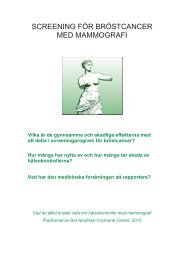1 Selective serotonin reuptake inhibitors (SSRI) â sales, withdrawal ...
1 Selective serotonin reuptake inhibitors (SSRI) â sales, withdrawal ...
1 Selective serotonin reuptake inhibitors (SSRI) â sales, withdrawal ...
Create successful ePaper yourself
Turn your PDF publications into a flip-book with our unique Google optimized e-Paper software.
In 1993, <strong>withdrawal</strong> reactions on paroxetine were acknowledged and it was recommended that the<br />
drug should not be discontinued abruptly (Medicines Control Agency, 1993). In 1996, <strong>withdrawal</strong><br />
reactions were described as “rare and not severe” (Price et al, 1996). In 1998, they were thought to<br />
be a “class effect” (Committee on Safety of Medicines, 1998) and in 2000, isolated reports of more<br />
serious symptoms were recognised (Medicines Control Agency, 2000). In 2004, a proportion of<br />
<strong>withdrawal</strong> reactions were thought to be “severe and disabling” (Committee on Safety of<br />
Medicines, 2004) and in 2005, they were described as “generally mild to moderate, self-limiting,<br />
but in some patients severe and prolonged” (European Medicines Agency, 2005).<br />
Referring back to early warnings<br />
By the time when the seriousness of benzodiazepine dependence and <strong>SSRI</strong> <strong>withdrawal</strong> reactions<br />
were acknowledged by the drug authorities, they referred back to earlier statements, but now<br />
labelled early warnings. For benzodiazepines, it was written in 1988 that, “there has been concern<br />
for many years,” (Medicines Control Agency, 1988) referring to a statement in 1980, which,<br />
however, was that, “the true addiction potential of benzodiazepines was low” (Committee on the<br />
Review of Medicines, 1980). For <strong>SSRI</strong>s, drug authorities in 2000 stated that, “whilst the <strong>withdrawal</strong><br />
symptoms reported were generally not serious, there have been isolated reports of more serious<br />
symptoms” (Medicines Control Agency, 2000) referring back to 1993, although the statements from<br />
that time were, “78 reports of symptoms occurring on <strong>withdrawal</strong> of paroxetine” and “it has been<br />
used extensively with around 370,000 prescriptions dispensed by the end of 1992” (Medicines<br />
Control Agency, 1993), suggesting that <strong>withdrawal</strong> reactions was not a problem.<br />
<strong>SSRI</strong> dependence potential<br />
The dependence potential of the <strong>SSRI</strong>s was consistently rejected by drug regulators. In 2000, EMA<br />
acknowledged that weak signals of addictive properties had been shown in some studies, but<br />
concluded that available evidence did not “suggest” that <strong>SSRI</strong>s cause dependence (European<br />
Medicines Agency, 1999/2000). Although the EMA stated that “the lack of evidence for<br />
dependence does not prove the absence of a problem,” the dependence potential was rather firmly<br />
rejected, saying that, “<strong>SSRI</strong>s do not cause dependence” or “data do not indicate that <strong>SSRI</strong>s cause<br />
dependence” or “no strong evidence suggest that <strong>SSRI</strong>s cause dependence.” It was noted that <strong>SSRI</strong>s<br />
“have been shown to reduce intake of addictive substances like cocaine and ethanol. The<br />
interpretation of this aspect is difficult.”





